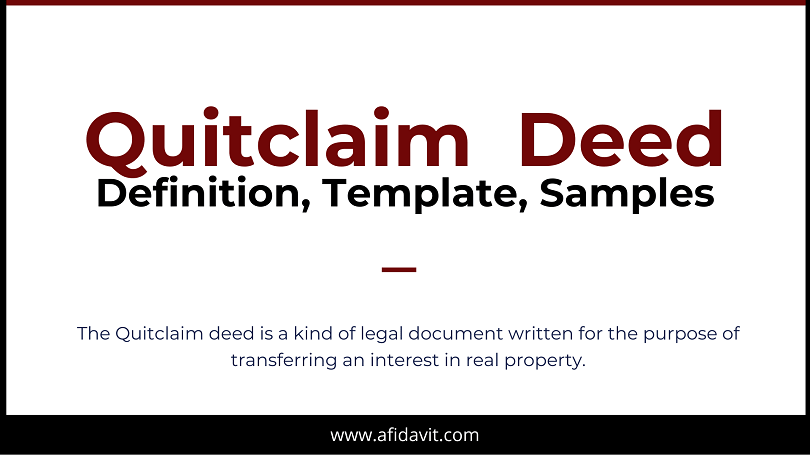Affidavits
Quitclaim Deed: Free Quitclaim Deed – Quitclaim VS Warranty Deed – When to use Quitclaim Deed?
Everything You Need to Know about Quitclaim Deed Affidavit

The Quitclaim deed is a kind of legal document written for the purpose of transferring an interest in real property. The person that transfers the interest is called a grantor, & when the deed of quitclaim is appropriately finalized & executed it transfers whatever interest the grantor has in the property to the grantee or recipient. The grantor suspends every right & claim to the property, therefore, enabling for the right to pass to the recipient or grantor.
Like most other property deeds, a quitclaim deed does not include a title agreement & this does not give the grantee any assurance as to the property title status. This deed is commonly used among family members or divorcing couples.
Property Title
A real estate title essentially indicates who owns the property at present. It mentions all the rights of possession of the property, as well as the capability of the grantor transferring or selling interest in the property, for example by deed.
When can a Quitclaim Deed be used?
A Quitclaim deed is used in certain situations only. Here are some common uses:
-
- A quitclaim deed can be used in a divorce to transfer title from one partner to the other.
- A quitclaim deed can be used for transferring property interest to a business partner.
- A quitclaim deed is used when parents transfer property to their children.
- A quitclaim deed can be used for transfer property to a sibling or any other relative.
- A quitclaim deed is used for the removal of an individual’s name from the title.
- A quitclaim deed is used for leaving a property in someone’s name on the grantor’s death.
Is a Quitclaim Deed taking me off the mortgage?
While a Quitclaim deed eliminates the name of an individual from the property title including the removal of their possession rights, it does not withdraw obligation for the mortgage on the property from that individual. So to make it clear, a signature on this deed will only strip away your rights on the property, however, it will not release you of fulfilling the debt of the property.
Quitclaim Deed vs. Warranty Deed
A warranty deed is a kind of legal real estate document composed for the purpose of providing a guarantee to the purchaser that the seller of the property has all the rights to sell it. The warranty deed warrants and pledges that the property is owned by the seller and the property is clear and free from all matters such as mortgages, outstanding liens, outstanding utility bills, and other encumbrances to it.
Whereas, a Quitclaim deed is one in which the grantor will not guarantee that they will retain a right to a piece of property. The grantor might have no interest in the property so they have no legal obligation to a grantor because they don’t make any guarantees.
Process of Filling the Quitclaim Deed
-
- Write down the names of the seller & receiver(s):
The seller or the grantor is the individual who is shifting their property interest to another individual(s). The receiver or the grantee(s) is at the recipient end of the interest. A grantor or grantee can be individuals or companies.
-
- Ascertain considerations:
Consideration is the cost for property interest which the grantee gives to the grantor. It is necessary to have a legal harmony to mention a sum for consideration in the document. Even as the transfer is a present, there is always a small sum, like $1 to $10, specified as consideration.
-
- Description of the property:
The Quitclaim deed requires to contain a legal description of the estate. You will find it in some previous deed or at the nearest County Clerk or Registry. In certain circumstances, even a parcel ID number may have to be specified on your Quitclaim Deed. Past tax statements contain this ID.
-
- Carry out the deed:
The grantor must sign the deed in front of the notary public to validate the deed. Along with a notary public, it is mandatory in certain states for eyewitnesses to sign the deed as well. When signed, the Quitclaim Deed will be deposited with the local County Clerk or Registry Office and will be forwarded to the grantee once it has been registered.
